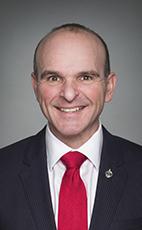Madam Speaker, I have the honour of speaking about the tax cut for the middle class, which will help millions of Canadians. We are determined to strengthen the middle class and help it grow because a strong middle class is key to a healthy economy and gives all Canadians a real and fair chance to succeed.
That is exactly what the bill before the House today will do. This bill reduces the tax rate from 22% to 20.5% for Canadians who earn between $45,282 and $90,563 in 2016. What is more, it introduces a new 33% income tax rate on income over $200,000, in other words, the higher income brackets in Canada.
Effective January 1, the government is making it possible for approximately nine million Canadians to keep more of their income each year. This is the smart thing to do and the measure is fair. Members will have the opportunity to hear more about this from other stakeholders in committee.
We already know that the response to the measures announced in December was favourable. We also know that the tax cut for the second personal income tax bracket will not solve all of the problems Canadians are facing today. That is why the government's commitment to be transparent and consult with Canadians will take on increasing importance. The government is taking this approach because it recognizes that it does not have a monopoly on good ideas.
The minister and the parliamentary secretary recently travelled across the country to talk to Canadians directly about what measures the government could take to help the middle class. They met with indigenous, business and cultural leaders to hear what Canadians had to say and initiate discussions to find practical solutions to the problems they are facing.
In my riding, Edmonton Centre, nine consultations were held on various round table topics in order to gain a clear understanding of what the people of Edmonton are concerned about. National consultations continued online and are still taking place today. The response rate and comments received show that Canadians strongly support the government's efforts. Since the online consultation began, the website has received more than 20,000 visits, and more than 2,500 separate observations have been submitted by individuals and focus groups.
The government also reached out to young Canadians by holding three separate live chat sessions with university students. Those sessions gave the government invaluable insight into the concerns of young Canadians all across the country. A total of 8,000 people participated in the live event on Facebook organized by Dalhousie University, and over 1,000 people have replayed it online.
I am encouraged that young Canadians have found new reasons to become engaged with their government. More than 80,000 people have engaged with us through various live events. That is almost the entire population of Prince George. Throughout the consultation process, Canadians confirmed that they want a government that will strengthen the middle class and help those working hard to join it.
I would love to focus only on the positive things we heard, but that would not reflect all the opinions and comments that were provided. For example, the Canadian Taxpayers Federation shared its concerns over what impact returning the tax-free savings account annual contribution limit to $5,500 might have on individuals' future savings. It does not like the new income tax bracket.
The government respects the opinion of the Canadian Taxpayers Federation, but does not agree that roughly 18% of the almost 11 million Canadians with a TFSA had made the maximum contribution to their accounts by the end of 2013. What is more, the government is reinstating indexation of the TFSA annual contribution limit so that the annual limit maintains its real value over time.
The measures in this bill will contribute to strengthening the middle class. That is the Government of Canada's priority. It has become increasingly clear through the pre-budget consultations that Canada's economic outlook has changed since the election.
This has only bolstered the government's resolve to accomplish what we were elected to do.
What is even more important is that discussions with fellow Canadians have given us new insights and allowed us to fine-tune measures that will be included in the next federal budget. The government's plan will be realistic, sustainable, prudent and transparent. The plan will also include other information on measures that will steer Canada towards a more prosperous, inclusive and sustainable economic future.
The government's plan includes introducing proposals to create a new Canada child benefit. Our objective is to start benefit payments in July 2016. This proposed benefit will simplify and consolidate current child benefits. It will replace the universal child care benefit, which is not income tested. The new child benefit will better target those who need it the most.
The government's approach to consultation recognizes that co-operation is essential in order to have real change. The government undertook to listen to MPs from all parties, have discussions and collaborate with them, and identify solutions in order to prevent the needless escalation of conflict. It has already shown its willingness to do so.
We have already heard from Canadians and many members of other parties, and therefore I look forward to discussing and debating the best way to serve Canadians.
Before my time runs out, I would like to take a minute to speak to the MPs present and Canadians at home today. This bill's proposed tax cut will help millions of Canadians. This tax cut will give middle class Canadians more income to spend and invest, which will result in economic growth. I am eager to hold discussions with my colleagues from all parties in order to find solutions to the problems Canadians are facing. I very much hope that they will support this initiative.

